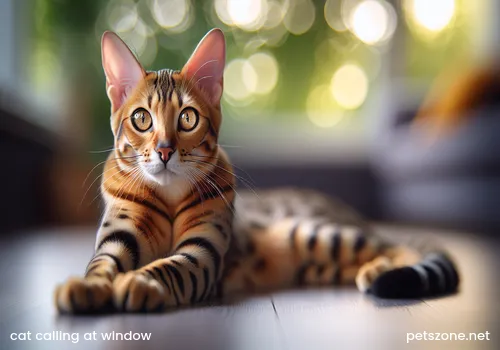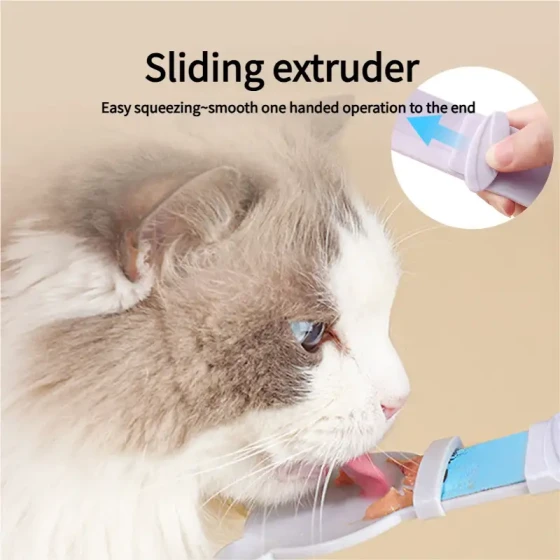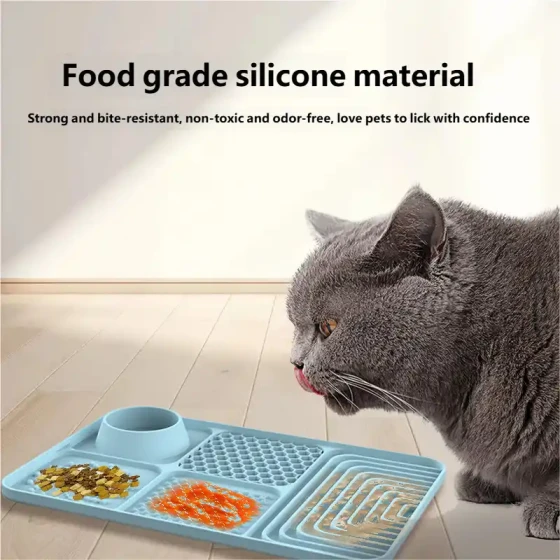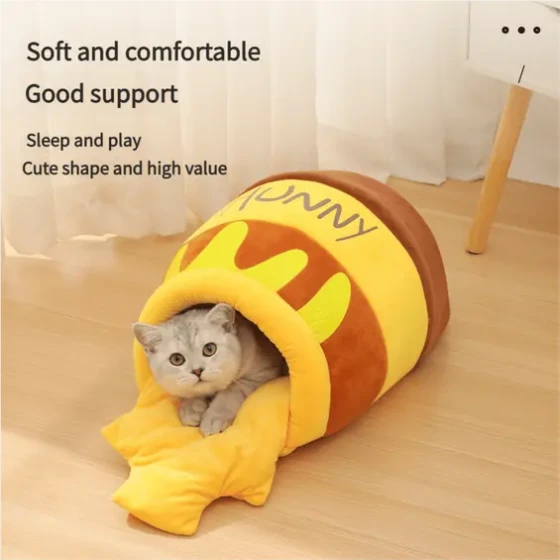Cat Calling at the Window Predicts Death_Correlation Between Cat’s Window Moaning and Signs of Life
Cats calling unusually by the window, especially accompanied by moaning or continuous vocalization, does not directly equate to a "premonition" of their imminent death. More precisely, this may be a manifestation of the cat's physical discomfort, pain, anxiety, cognitive impairment, or other health issues, which in some cases may be associated with aging or late-stage illness. Therefore, if your cat exhibits this behavior, the best course of action is to take it to the veterinarian promptly to identify the real cause, rather than interpreting it as a mysterious death signal.

For many "pet owners," every move of their cat touches their heart. When they see their usually lively and cute little companion suddenly acting abnormally, running to the window and making sad calls, it is inevitable to have various worries, even associating it with some folk sayings or ominous premonitions. Especially the saying "cat calling at the window predicts death," which is widely spread among some pet communities and sounds unsettling. But as responsible owners, we need to understand cat behavior with a scientific and caring attitude rather than being troubled by baseless superstitions.
Why do cats call?
To understand cat behavior, we must first understand what their calls represent. Cats do not communicate through complex language like humans; their vocalizations are one of the important communication methods. Different tones, frequencies, and lengths of calls express different needs and emotions, such as:
- Greeting or attracting attention: A short "meow" is usually a greeting or a request for your attention.
- Hunger or needs: Continuous calling may indicate hunger or wanting you to open a door, pour water, etc.
- Affection or contentment: Soft purring usually represents comfort and satisfaction.
- Pain or discomfort: Sharp, continuous, or abnormal calls may indicate pain, discomfort, or bodily problems.
- Anxiety or fear: Low growls or hissing are warnings, while continuous moaning may express anxiety or fear.
- Estrus: Unneutered cats may make special, usually louder and continuous calls during heat.
- Cognitive impairment: Elderly cats may vocalize meaninglessly and repetitively due to cognitive decline, especially at night.
Clearly, vocalization is the "language" of cats. Sudden or abnormal calls, especially moaning, are often attempts to convey "I don’t feel right" to us.
Why do cats favor the window?
Windows are very attractive places for cats for many reasons:
- Observing the world: The window is like a "TV" for cats to learn about the outside world. They like to lie by the window watching birds, pedestrians, falling leaves, satisfying their curiosity and hunting instincts.
- Enjoying the sunshine: Cats are "sunbathing enthusiasts," and the warm sunlight makes them feel relaxed and comfortable.
- Seeking stimulation or relaxation: The outside scene can provide mental stimulation, and the window area is usually quiet and can be a place for rest.
- Perceiving environment: Cats sense changes in the external environment through the window, such as temperature or wind direction.
Therefore, a cat going to the window itself is a very normal behavior. The problem arises when this behavior is accompanied by abnormal vocalization that requires deeper investigation.
Potential correlation between moaning and end-of-life (not a premonition)
The connection between cats moaning by the window and death is circulated likely because some people observed that sick or elderly cats do exhibit abnormal behavior, including vocalizing in unusual places like by the window.
However, this is not due to any magic in the window itself but because cats may moan by the window or anywhere for the following reasons:
- Pain or discomfort: Illness-related pain, nausea, breathing difficulty, and other discomforts may cause irritability or suffering, expressed through vocalization. They might coincidentally feel pain at the window or find the window area provides certain conditions (like sunlight or ventilation) that relieve discomfort.
- Confusion or disorientation: Older cats, particularly those with feline cognitive dysfunction syndrome (similar to human Alzheimer’s), may feel confused or lost, even forget where they are. This anxiety and unrest may lead them to wander purposelessly and vocalize, including by the window. They might seek help or comfort through their calls.
- Seeking solitude or security: Some sick cats may look for quiet, hidden places to hide when weak. This might be a corner, under the bed, or high spots by the window they commonly like. If they feel uncomfortable there, they may also vocalize.
- Abnormal temperature regulation: Sick cats may have impaired temperature regulation and seek warmer sunshine or cooler ventilation by the window. Discomfort may accompany these calls.
- Perceiving environmental changes: There is a theory that cats may be highly sensitive to subtle environmental changes, including atmospheric pressure and temperature, even weather or larger natural phenomena. But linking these directly to death lacks scientific evidence.
Therefore, the moaning by the window is more like a sign of overall health changes rather than an isolated "death premonition." It reminds us that the cat may be ill and needs our attention and assistance.
True end-of-life signs to watch for
Compared to window calling behaviors that may stem from multiple causes, cats nearing the end of life usually show more definitive physical and behavioral changes. These signs are often multiple and require comprehensive judgment:
- Significant changes in appetite and water intake: Loss or sharp decline in appetite, loss of interest even in favorite foods. Water intake may decrease.
- Weight loss: Wasting caused by disease or reduced appetite.
- Depression, lethargy, and increased sleep: Spending most time sleeping, low energy, slow to respond to stimuli.
- Hiding behavior: Weak cats tend to find hidden, quiet places to avoid disturbance.
- Behavior changes: Cats normally affectionate may become distant; cats usually independent might become clingy (though hiding is more common). They may stop grooming, causing fur to look messy and dull.
- Breathing changes: Breathing becomes shallow, rapid, or labored, sometimes audible wheezing.
- Body temperature drops: Feeling cooler to the touch than usual.
- Urinary or fecal incontinence or difficulty: May lose control over elimination or have difficulty voiding.
- Abnormal odors: Body or breath may have unusual smell.
- Unsteady gait or weakness: Wobbling when walking, difficulty standing.
- Persistent vocalization changes: Continuous, low, painful, or meaningless calls regardless of location.
If these signs appear simultaneously and persist, the cat's health condition may be very poor.
What should you do if your cat calls unusually by the window?
First, don’t panic or be frightened by the "death premonition" notion. The scientific and responsible approach involves these steps:
- Observation: Carefully observe whether the calling is occasional or continuous? What is the type of call (moaning, screaming, low growling)? Besides calling, does the cat show any other abnormal signs? For example, appetite, spirit, mobility, breathing, etc.
- Check environment: Examine whether factors near the window cause discomfort, e.g., loud noise, irritating smells, unsafe climbing spots.
- Physical check: If the cat permits, gently check for obvious wounds, swelling, or other discomfort signs. Note reactions to touching specific areas.
- Record: Note the time, frequency, duration of abnormal calls, and accompanying symptoms, as these information are very important for the veterinarian.
- Seek veterinary care immediately: This is the most crucial step. Whatever your suspicion about the cause, abnormal vocalization, especially moaning, may signal that the cat needs help. Take your cat to a professional vet as soon as possible. The vet will perform detailed inquiries, physical exams, and possibly necessary tests or imaging to determine the true cause of the vocalization and offer professional treatment advice.
A complete veterinary examination usually costs several hundred to over a thousand yuan, but this is the most effective way to ensure the cat's health and relieve pain. This expense is absolutely worth it.
Frequently Asked Questions
- Why do cats like calling by the window?
Cats call by the window usually to observe the outside world, seek attention, express needs, or simply because of boredom. Normal, intermittent calls usually do not require worry. - What are common signs when cats near death?
Common signs include sharply reduced appetite and water intake, weight loss, depression, lethargy, hiding, stopping grooming, breathing difficulty, low body temperature, incontinence, etc. - Is sudden change in cat’s vocalization normal?
Sudden abnormal, continuous, or painful vocal changes are usually not normal and may indicate discomfort, pain, anxiety, or illness and should be taken seriously. - Should I worry about my cat calling at the window?
If the calling at the window is abnormal, moaning, and accompanied by other behavior or physical changes, you should be concerned it may be ill and promptly seek veterinary care. Normal calls by the window alone are generally harmless. - How to tell if my cat is sick?
Determining illness requires observation of mental state, appetite, water intake, elimination, behavior, breathing, body temperature, weight, and more. Any persistent, significant abnormality may indicate illness.
Conclusion
"Cat calling at the window predicts death" is mostly a folk saying lacking scientific basis. Moaning or abnormal calls by the window indicate the cat may be experiencing physical or mental distress. This is not the time to wait for a "premonition" but a critical moment to act and seek professional veterinary help. Through scientific diagnosis and timely intervention, many underlying issues can be alleviated or cured. Even when facing irreversible aging or disease, under veterinary guidance, palliative care and end-of-life care can provide comfort and peace in the final stage. As responsible "pet owners," we should learn to understand the signals cats send and respond practically to their calls for help.

-560x560.webp)

